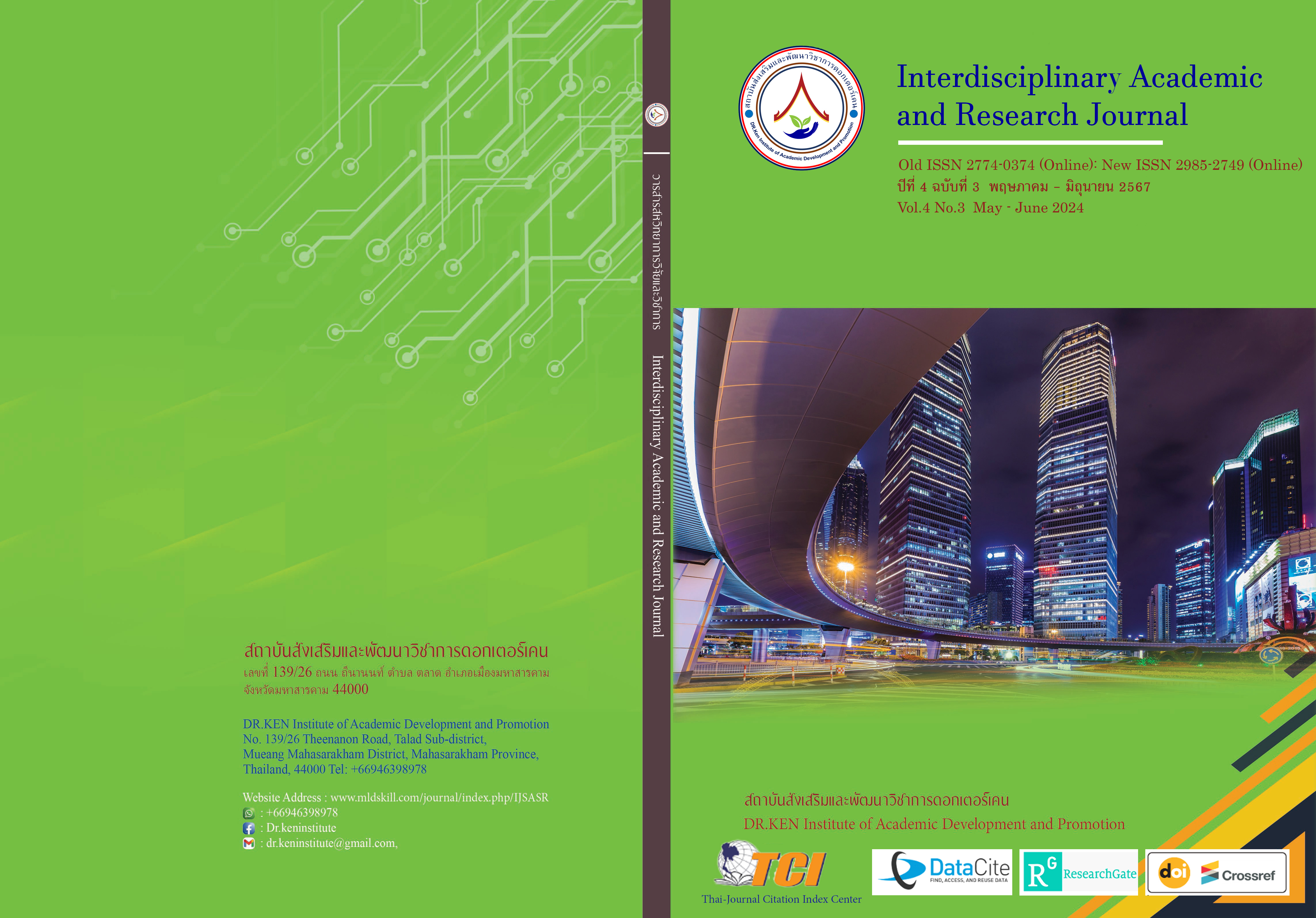Competency for a Digital Technology of School Administrators Lopburi Primary Era 4.0
DOI:
https://doi.org/10.60027/iarj.2024.276226Keywords:
Competency; , Digital Technology; , Educational Institution AdministratorsAbstract
Background and Aims: The digital technology competence of educational institution administrators in the 4.0 era emphasizes adapting and developing skills to suit changes in technology in educational institutions. Creating this digital capability Emphasis is placed on learning all the time to adapt to changes in technology and developing skills in using technology in educational institution management. Educational institution administrators in the 4.0 era need to be leaders who have knowledge and understanding of both technology and education to be able to use technology effectively in managing educational institutions. efficiently and covering all aspects of administration and development in educational institutions in the digital age Developing competencies in digital technology is therefore important in preparing and adapting to changes in technology in educational institutions today and in the future.
Methodology: Improving teachers' digital competency is now a priority for educational organizations around the world. As can be seen from abroad, a framework for developing the digital competencies of educators has been established to be used as a framework for developing the competencies of educators, totaling 5 editions, consisting of (1) a framework for developing the digital competencies of educators (European Framework for the Digital Competence of Educators: DigCompEdu) (2) Framework for the development of teachers' information and communication technology competencies set by UNESCO (UNESCO ICT Competency Framework for Teachers: ICT CFT) (3) Framework for the development of the digital teaching profession (Digital Teaching Professional Framework: DTPF) (4) Framework for developing teachers' professional digital competencies. (Professional digital competence framework for teachers: PDCF) and (5) The Common Digital Competence Framework for Teachers: CDCFT
Results: Developing the potential of educational innovators to achieve maximum efficiency and effectiveness is Emphasis must be placed on continuous and sustainable development. The organization must have management that facilitates learning that will lead to innovation among personnel. Both at the individual level, group level, and organizational level. Or it can be called It is management for innovative sustainability, aiming to be a learning organization. Including appropriate knowledge management and information technology management. Obstacles encountered are: Executives still use traditional management methods that are inconsistent with the use of digital technology. Lack of use of innovative media and digital technology especially Teachers are still not encouraged to use digital technology in teaching and learning. Measure and evaluate results The problem with developing teachers' digital competencies in Thailand is that a framework for developing digital competencies of teachers and educational personnel has not yet been developed. There is still only the determination of the level of digital competency of teachers and educational personnel at the basic education level into 3 levels: basic digital competency. Intermediate digital competencies and advanced digital performance divide development into 7 stages, but have not yet determined the digital competencies that must be developed at each level.
Conclusion: To maximize effectiveness and efficiency, educational staff members must be encouraged to learn new things and be creative. A structured framework for assessing and enhancing teachers' digital competencies is necessary to overcome barriers like antiquated management techniques and a lack of digital technology integration, thereby fostering long-term innovation in education.
References
กณิชชา ศิริศักดิ์. (2559). การวิจัยหลักสูตรวิชาชีพครูเพื่อพัฒนาแนวทางการส่งเสริมสมรรถนะดิจิทัล. วิทยานิพนธ์ ปริญญาครุศาสตรมหาบัณฎิต สาขาวิชาวิธีวิทยาการวิจัยการศึกษา. จุฬาลงกรณ์มหาวิทยาลัย.
กนิชชา ศิริศักดิ์. (2559). การวิจัยหลักสูตรวิชาชีพครูเพื่อพัฒนาแนวทางการส่งเสริมสมรรถนะดิจิทัล. จุฬาลงกรณ์มหาวิทยาลัย.
กระทรวงดิจิทัลเพื่อเศรษฐกิจและสังคม สำนักงานคณะกรรมการดิจิทัลเพื่อเศรษฐกิจและสังคมแห่งชาติ. (2562). สรุปผลการสำรวจข้อมูลสถานภาพการรู้เท่าทันสื่อและสารสนเทศของประเทศไทยปี พ.ศ. 2562: Media and Information Literacy Summary Survey Report Thailand 2019. พิมพ์ครั้งที่ 2. กรุงเทพฯ: สำนักงานคณะกรรมการดิจิทัลเพื่อเศรษฐกิจและสังคมแห่งชาติ กระทรวงดิจิทัลเพื่อเศรษฐกิจและสังคม.
กิตติพศ โกนสันเทียะ. (2565). สมรรถนะดิจิทัล สมรรถนะใหม่สําหรับครูยุคปัจจุบัน. วารสารศึกษาศาสตร์มหาวิทยาลัยทักษิณ, 22 (2),14–37
ไพฑูรย์ สินลารัตน์. (2559). การศึกษา 4.0 เป็นยิ่งกว่าการศึกษา. กรุงเทพฯ: โรงพิมพ์แห่งจุฬาลงกรณ์มหาวิทยาลัย.
รับขวัญ ภูษาแก้ว. (2557). กลยุทธ์การบริหารคนเก่งและองค์การสมรรถนะสูงสำหรับโรงเรียน มัธยมศึกษา. วิทยานิพนธ์ครุศาสตรดุษฎีบัณฑิต สาขาวิชาบริหารการศึกษา จุฬาลงกรณ์ มหาวิทยาลัย.
สุธรรม ธรรมทัศนานนท์. (2562). การบริหารสถานศึกษาสู่คุณภาพการศึกษายุคใหม่. ขอนแก่น : แอนนา.
European Union (2006). European Union country report 2006. Retrieved from: https://www.unccd.int/sites/default/files/prais-legacy/European%20Union/2006/European%20Union%20-%20DCP%20-%202006%20eng.pdf
Gallardo-Echenique, E., Oliveira, J., & Marqués Molías, L., & Esteve, F. (2015). Digital Competence in the Knowledge Society. MERLOT Journal of Online Learning and Teaching (JOLT). 11. 1-16.
Downloads
Published
How to Cite
Issue
Section
License
Copyright (c) 2024 Interdisciplinary Academic and Research Journal

This work is licensed under a Creative Commons Attribution-NonCommercial-NoDerivatives 4.0 International License.
Copyright on any article in the Interdisciplinary Academic and Research Journal is retained by the author(s) under the under the Creative Commons Attribution-NonCommercial-NoDerivatives 4.0 International License. Permission to use text, content, images, etc. of publication. Any user to read, download, copy, distribute, print, search, or link to the full texts of articles, crawl them for indexing, pass them as data to software, or use them for any other lawful purpose. But do not use it for commercial use or with the intent to benefit any business.
















.png)


